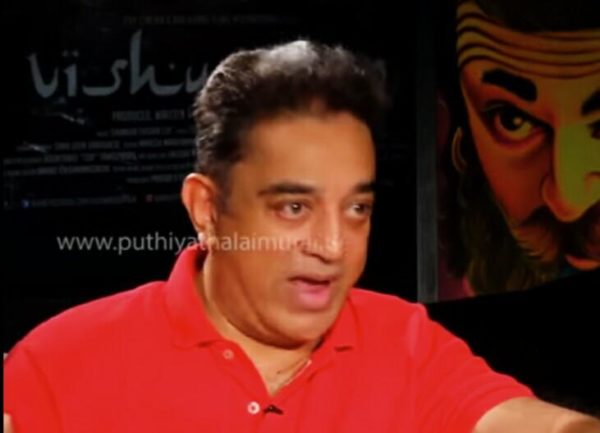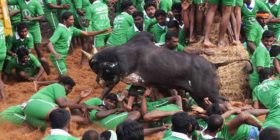Ever since the pro-jallikattu protests broke out in Tamil Nadu, actor Kamal Haasan has been actively, frankly and openly expressing his political views on on social media.
Speaking to Karthigaichelvan of Puthiya Thalaimurai TV, Kamal said that his political expressions were not new, and that he’d always been interested in politics and found in Twitter a conducive medium. “I was vocal about my views even as a 21-year-old boy. I used to write in weekly newspapers,” he said.
Commenting on increasing political participation from the public in Tamil Nadu, Kamal said that this was a positive sign, and that such agitations and revolutions come when the time is right.
Drawing a parallel between cinema and politics, Kamal said that, just as he was first a film fan before becoming an artiste, he was first a citizen of the country.
“We waste the powerful tool that is democracy by taking money and freebies as voters,” he said. Kamal added that politics had now become a profession instead of falling within the ambit of duty. He also cited the example of the late P Kakkan, a Dalit leader, freedom fighter and politician known for his simplicity, to note how rare such people were in today’s Tamil Nadu politics.
He agreed with the anchor that politics had become more about personalities. Making a possible reference to OPS being subdued under Jayalalithaa’s influence, Kamal said, “Many politicians of today were mere initials and silhouettes hidden under a large shadow. We’re getting to see them only now.”
Kamal also said that political ideologies had to change with the times and that the Dravidian political parties, too, had come up to meet the demands of their times.
“Even if the political leaders who built these parties had never been born, these parties would have come up because it was necessary for them to come up in those times,” he asserted. He noted that just as the Manusmriti had been replaced with the IPC, there should be a natural evolution in politics too.
Asked if he felt whether the Dravidian parties had accomplished what they had set out to do, Kamal said, “I have to say no. But I will say that even about my acting. The needs of the people are so great that there’s no point in chest-beating about the 1% or 2% of success that you’ve had.”
Kamal also said that he wished to see an end to caste, and that class distinction itself was more than enough to deal with.
“The babies whom Bharathiyar sang about became grandfathers and died. We’re now pretending that there is no caste but nobody has been able to get rid of it,” Kamal pointed out. He noted that caste is integral to electoral politics, just as corruption was.
“Votes are for sale. If you’ve sold your vote, you are expected to be quiet for the entire term and do your work,” said Kamal. The actor talked about how deeply ingrained corruption was, and observed that you could see it at every step. He added that he hadn’t always been in a position of privilege, but had remained true to his principles even at times when he was struggling to find work.
Explaining his tweet that had asked the people to receive the AIADMK MLAs according to the way they’d behaved, Kamal said that he was frustrated with the kind of politics that celebrated people like Trump who did nothing to eradicate poverty but were popular because they could speak in a certain way.
When asked why he wanted a re-election in Tamil Nadu despite Edappadi Palaniswami proving his majority, Kamal said, “If the headmaster of a school commits a mistake, we can’t say let him continue till the term ends. The laws were made for the people. At one point, it might be necessary to scrap them and put in new ones.”
Referring to VK Sasikala without naming her, Kamal said that this wasn’t about one person’s corruption but a group pf people. “Why are they still walking around with her picture if not so?” he asked.
Kamal said it was the people who decided who should be CM and not the party. “It’s based on someone’s popularity among the people that the party makes the person a leader and even those who’d been cursing the person start supporting them!” he said, adding that both MGR and Jayalalithaa had also faced opposition in their initial years.
Kamal mentioned that he’d suffered due to corruption for the last 15 years in various ways and that it would be good if such things were not repeated in future. He also added that media organisations shouldn’t be affiliated to political parties.
Asked what he felt about the mystery surrounding Jayalalithaa’s death, Kamal said, “I don’t know. If we can’t trust in the hospital or the police… we need a new kind of revolution. Maybe it’s time to throw out democracy then? If we have questions, we should definitely ask. We do have a right to ask but we can’t turn it all into a conspiracy.”
However, Kamal agreed that the secrecy surrounding Jayalalithaa had been wrong.
The actor went on to speak about the losses of over Rs 55 crore that he’d suffered during the Viswaroopam film controversy. “It was horrendous to blame it on the Muslims,” he said.
He explained that at the time, he’d said he would leave the state and even the country because of the difficulties he faced.
“I didn’t do any wrong. I was only looking after my business. Even the controversy over the naming of Sandiyar, I believe, was politically motivated,” he said. “Maybe I was paranoid…but it’s true that it was resolved only after I went and spoke to the necessary people.”
Kamal openly blamed the Viswaroopam controversy on Jayalalithaa without mentioning her name, saying, “It was the one person… the person who was in power. It wasn’t the communists or the DMK.”
Kamal said that the film industry faced a fair amount of difficulties from politicians, and that discussions were on within the industry on how to combat this. “I can be a whistleblower on this, but we are still speaking about it internally,” he said.
Kamal also talked about the culture of censorship prevailing in the country, referring to “cultural censors” and went on to talk about politics within the industry, his views on entering politics and more.






Leave a reply